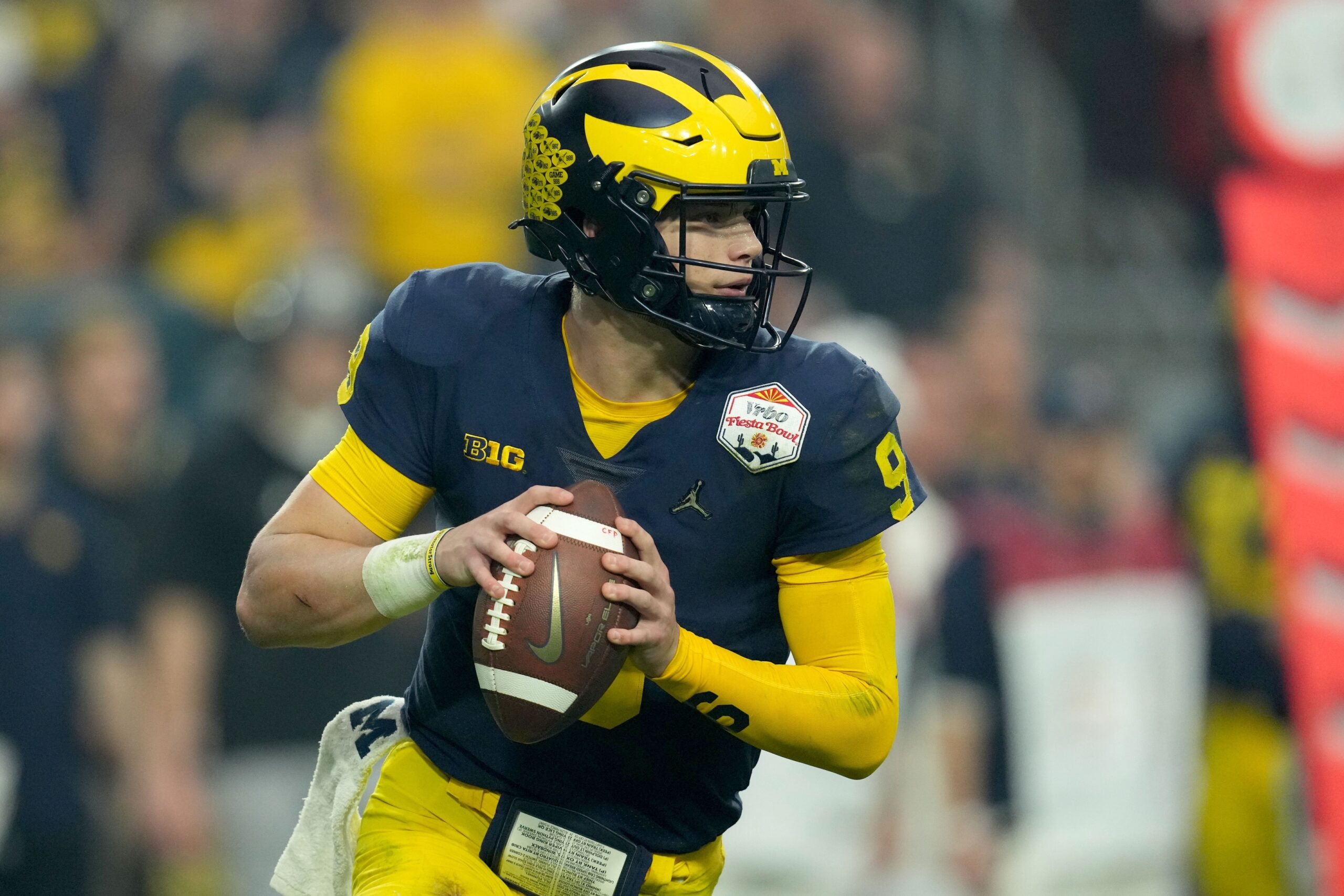JJ McCarthy’s Injury and Surgery
/cdn.vox-cdn.com/uploads/chorus_image/image/71873851/1245372218.0.jpg)
JJ McCarthy, the starting quarterback for the University of Michigan Wolverines, underwent surgery on his left knee after sustaining an injury during the team’s spring practice. The injury, which occurred during a non-contact drill, sidelined McCarthy for the remainder of the spring and raised concerns about his availability for the upcoming season.
Nature of the Injury, Jj mccarthy knee surgery
McCarthy suffered a torn anterior cruciate ligament (ACL), a significant injury that affects the stability of the knee joint. The ACL is a strong ligament that connects the thighbone (femur) to the shinbone (tibia) and plays a crucial role in controlling the forward movement of the tibia. A torn ACL often results from sudden twisting or pivoting motions, which can happen during sports activities. McCarthy’s injury occurred during a drill that involved a change of direction, suggesting a possible mechanism of injury consistent with an ACL tear.
Surgical Procedure
McCarthy underwent a successful ACL reconstruction surgery, a procedure designed to repair the torn ligament and restore stability to the knee joint. The surgery involved using a graft, typically taken from another part of the body, to replace the torn ACL. The graft is secured to the femur and tibia using screws or other fixation devices. The specific type of graft and fixation technique used for McCarthy’s surgery have not been publicly disclosed.
Expected Recovery Timeline
The recovery timeline for an ACL reconstruction surgery is typically lengthy, ranging from 6 to 9 months. McCarthy’s rehabilitation process will involve a series of stages, including immobilization, range of motion exercises, strengthening exercises, and gradually increasing activity levels. The goal of rehabilitation is to restore full range of motion, strength, and stability to the knee joint.
The rehabilitation process is crucial for a successful recovery and return to play. It is important for athletes to follow their rehabilitation program diligently and work closely with their physical therapists to ensure proper healing and a safe return to activity.
The anticipated return to play date for McCarthy will depend on the individual’s progress during rehabilitation. In some cases, athletes can return to play as early as 6 months after surgery, while others may require up to 9 months or longer. Factors that can influence the recovery timeline include the athlete’s age, fitness level, and the complexity of the surgery.
Based on typical recovery timelines for ACL reconstruction surgery, McCarthy could potentially be available for the start of the upcoming football season, but a full recovery and return to play may not be possible until later in the season.
Impact on Michigan Football

JJ McCarthy’s knee surgery presents a significant challenge for the Michigan Wolverines, who are aiming for another successful season in the Big Ten and a deep run in the College Football Playoff. McCarthy’s absence, while potentially temporary, will undoubtedly impact the team’s offensive strategy and performance.
Evaluating Michigan’s Quarterback Depth
McCarthy’s absence will require the Wolverines to rely on their backup quarterbacks, with each possessing a unique set of strengths and weaknesses.
- Strengths and Weaknesses of the Backup Quarterbacks: A thorough analysis of the backup quarterbacks’ abilities is crucial to understand their potential contributions and limitations. This analysis should include a comparison of their passing accuracy, mobility, and experience in high-pressure situations.
Potential Adjustments to Michigan’s Offensive Strategy
The Wolverines will need to adjust their offensive game plan in McCarthy’s absence, potentially opting for a more conservative approach with a focus on running the ball and limiting turnovers.
- Offensive Scheme Modifications: Michigan’s coaching staff should consider implementing adjustments to the offensive scheme, such as simplifying play calls and incorporating more run-heavy plays. This approach would minimize the burden on the backup quarterback and allow the running backs to carry a heavier workload.
- Personnel Decisions: The Wolverines may also need to adjust their personnel decisions, potentially relying more heavily on experienced players in key positions. This could involve increased playing time for senior offensive linemen or veteran wide receivers.
Historical Context and Comparison: Jj Mccarthy Knee Surgery

Knee injuries are unfortunately common in college football, especially for quarterbacks who are constantly exposed to hits and tackles. Examining the recovery trajectories of other high-profile quarterbacks who have sustained similar injuries provides valuable context for understanding JJ McCarthy’s situation.
Notable Instances of Knee Injuries in College Football Quarterbacks
Comparing McCarthy’s injury and expected recovery timeline to other prominent quarterbacks who have faced similar challenges helps illustrate the potential range of outcomes and the factors influencing recovery.
- Joe Burrow (LSU): Burrow, the 2019 Heisman Trophy winner, suffered a torn ACL and MCL in his left knee during the 2018 season. He underwent surgery and missed the remainder of the season. However, he returned stronger than ever in 2019, leading LSU to a national championship and becoming the No. 1 overall pick in the 2020 NFL Draft. His recovery and subsequent success demonstrate that a significant knee injury does not necessarily hinder a quarterback’s future prospects.
- Trevor Lawrence (Clemson): Lawrence, the No. 1 overall pick in the 2021 NFL Draft, sustained a torn ACL in his left knee during a spring practice in 2020. While he missed the majority of the 2020 season, he returned to play in the national championship game and went on to become a highly successful NFL quarterback. His experience highlights the potential for a full recovery and continued success even after a major knee injury.
- Deshaun Watson (Clemson): Watson, a former Heisman Trophy finalist, suffered a torn ACL in his right knee during the 2014 season. He missed the remainder of the season but returned in 2015 to lead Clemson to a national championship game appearance. Despite the injury, Watson went on to become a highly successful NFL quarterback, demonstrating the possibility of overcoming a serious knee injury and achieving elite status.
Recovery Trajectories and Long-Term Impact
While these quarterbacks have experienced successful recoveries, it’s crucial to recognize that each individual’s journey is unique and influenced by factors such as the severity of the injury, the quality of medical care, and the athlete’s commitment to rehabilitation.
- Timelines: While the expected recovery time for a torn ACL is generally around 9-12 months, individual cases can vary. Burrow, for example, returned to the field in less than a year, while Lawrence’s recovery took longer. The specific nature of the injury, the individual’s age, and the rehabilitation plan all play a role in determining the recovery timeline.
- Long-Term Impact: The long-term impact of a knee injury on a quarterback’s career can be complex. While some quarterbacks have returned to their pre-injury level of performance, others may experience a decline in mobility or athleticism. Factors like the type of injury, the effectiveness of rehabilitation, and the quarterback’s ability to adapt their playing style can influence their long-term success.
- Mental Impact: Beyond the physical challenges, a significant knee injury can also have a significant mental impact on an athlete. The fear of re-injury, the frustration of missing playing time, and the uncertainty about their future can all affect their confidence and performance. This aspect of recovery is often overlooked, but it’s essential to address the mental and emotional needs of athletes as they navigate the rehabilitation process.
Jj mccarthy knee surgery – JJ McCarthy’s knee surgery is a major setback for the Wolverines, especially considering the team’s offensive firepower. While the injury is a blow, it’s a reminder of the fragility of athletic careers. We’ve seen this before with justin jefferson , whose own journey to stardom was marked by adversity.
McCarthy’s recovery will be a test of his resilience, and hopefully, he’ll return stronger than ever, just like Jefferson did.
The recent announcement of JJ McCarthy’s knee surgery has raised concerns about his long-term health and performance. While the details of the procedure remain shrouded in secrecy, the lingering effects of his previous knee injury raise questions about his ability to fully recover.
It’s a critical juncture for McCarthy, and the success of his surgery could significantly impact his future in the game.
